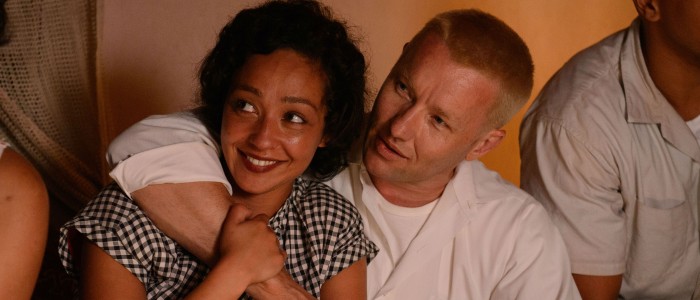Review: 'Loving' May Be Jeff Nichols' Most Moving Film Yet
Note: With Loving in limited release this weekend, we're re-running our review from the TIFF.Jeff Nichols has never been one for outsized drama. It's not that dramatic things don't happen in his movies — on the contrary, his films are full of superpowered kids and apocalyptic dreams and the like. But he often seems less interested in big events than in all the moments in between, the everyday bonds and minute details that make up the textures of everyday life.
In Loving, Nichols applies that same approach to the 1967 Supreme Court case Loving v. Virginia, which struck down anti-miscegenation laws across the country. Aided by awards-worthy performances from Joel Edgerton and especially Ruth Negga, Nichols delivers an intimate drama that feels all the bigger for keeping its scope so resolutely small.
Nearly half a century removed from the landmark Supreme Court decision that bears their name, it's easy to think of the Lovings as simple heroes or abstract concepts. But as portrayed by Nichols, they're normal flesh-and-blood people. Richard is a taciturn builder who works on cars in his free time; Mildred is his adored and adoring girlfriend. They spend their days attending drag races and parties and their evenings having dinner with their families. They seem happy and ease with each other, and dream of someday building a home together.
In other words, Richard and Mildred are like any other rural Virginia couple. The interracial nature of their relationship does not go unnoticed in their hometown, but the occasional snide comment or dirty look is as bad as it gets. Until, that is, she gets pregnant and they decide to marry. Shortly after the courthouse wedding, Richard and Mildred are hauled off to jail for committing the crime of miscegenation. They're bailed out in a matter of days, but it takes years for them to truly win the right to the perfectly ordinary life they've always dreamed of.
The Lovings don't set out to change history. At first, they're only interested in changing their own circumstances — it's not until much later that they acknowledge their legal battle could "help a lot of people," as they so understatedly put it. And even then, it's Mildred quietly leading the charge, while Richard hesitantly follows. Here, too, Richard's attitude is informed less by his principles than by his personal desires. He's a simple man who just wants to take care of his family, and he's genuinely scared by the attention their case attracts.
Edgerton, fresh off of Nichols' Midnight Special, may have found his best role yet in Richard. The character is stoic and withdrawn by nature, but Edgerton communicates everything he needs to with a level gaze or a furrowed brow. Negga is somehow even better as Mildred, finding the grit underneath her grace. There's nothing about her Mildred that feels all that extraordinary, and yet it's impossible to look away whenever Negga is onscreen. And both performances are elevated by their chemistry with each other. The Lovings' love doesn't just feel worn-in, it feels like it's always existed and always will.
Nichols' restraint serves him well when it comes to the Lovings, reframing this monumental victory in the context of its everyday impact. The Lovings manage to eke out a life together despite the laws of their county, but it's compromised in a million little ways. Richard becomes understandably paranoid, panicking when a car trails too closely behind him or when another car drives up to the house too quickly. Mildred tosses and turns in the couple's new home in DC, teetering on the brink of despair when her sister visits with news about the friends and family the Lovings have been forced to leave behind. Through them we understand that the right to marry doesn't stop or start at wedding bells — it's really about the right for the Lovings to live their lives in peace.
Nichols' low-key approach is less helpful in understanding what drives the characters fighting against the Lovings. Numerous people tell Richard he "should know better" than to marry a black woman, and a judge invokes God's law in handing down his sentence to the Lovings, but Nichols generally lets the audience fill in the blanks themselves when it comes to the cultural and societal forces behind that racism. Nor does he offer any real villains, aside perhaps from the sheriff who initially arrests them. As a result, the Lovings feel real and immediate, but the forces allying against them feel faceless and abstract.
But then again, the Lovings don't really care to understand the outrage either. To them, their marriage just their marriage, not a symbol or a political stance. In the end, the verdict in Loving v. Virginia is portrayed almost as a footnote to the everyday lives of Richard and Mildred Loving. They hear about the decision while at home, and then carry on with their day. Nothing has changed, and everything has. The Lovings have been living their lives for years, but they're finally free to do so in a way that they never have before. The real legacy of Loving v. Virginia lies in the fact that we take for granted today what this couple had to fight so hard for.
/Film rating: 9.0 out of 10

